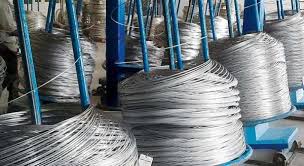Stainless wire, though often overlooked, is a crucial pvc coated stainless wire rope component in a wide range of applications, from industrial machinery to everyday household items. Its versatility and durability make it an unsung hero in modern engineering and manufacturing.
What is Stainless Wire?
Stainless wire is a type of wire made from stainless steel, which is an alloy of iron with chromium, nickel, and sometimes other elements. The chromium content in stainless steel creates a thin, invisible layer of chromium oxide on the surface of the wire, which prevents corrosion and rust. This property makes stainless wire highly resistant to various forms of environmental damage.
Types of Stainless Wire
- Austenitic Stainless Wire: This is the most common type of stainless wire, characterized by its excellent corrosion resistance and good formability. It contains high levels of chromium and nickel and is typically used in applications like springs, filters, and mesh.
- Ferritic Stainless Wire: Known for its magnetic properties and resistance to stress corrosion cracking, ferritic stainless wire is used in automotive exhaust systems and other high-temperature applications.
- Martensitic Stainless Wire: This type of stainless wire has high strength and hardness due to its high carbon content. It’s often used in applications requiring high strength and wear resistance, such as in knives and surgical instruments.
Applications of Stainless Wire
- Industrial and Manufacturing: Stainless wire is used in the production of various industrial components, including springs, cables, and wire ropes. Its durability and resistance to wear make it ideal for demanding applications.
- Construction: In construction, stainless wire is used in reinforcing concrete, as well as in architectural applications where both strength and aesthetics are important. Stainless steel wire mesh is commonly used in concrete reinforcement, fencing, and as decorative elements.
- Medical and Surgical Instruments: The biocompatibility and corrosion resistance of stainless wire make it suitable for medical and surgical instruments. It’s used in tools like tweezers, surgical needles, and implants.
- Consumer Goods: Stainless wire is also found in everyday items such as kitchen utensils, jewelry, and household appliances. Its resistance to corrosion and staining ensures longevity and easy maintenance.
- Automotive: In the automotive industry, stainless wire is used in various components including brake lines, fuel lines, and exhaust systems. Its ability to withstand high temperatures and corrosive environments makes it an essential material for vehicle parts.
Advantages of Stainless Wire
- Corrosion Resistance: The primary advantage of stainless wire is its resistance to rust and corrosion, making it ideal for use in harsh environments.
- Strength and Durability: Stainless wire maintains its strength and durability under high-stress conditions, which is crucial for many industrial applications.
- Aesthetic Appeal: The sleek, shiny appearance of stainless wire makes it a popular choice for decorative applications, from jewelry to architectural elements.
- Low Maintenance: Stainless wire requires minimal maintenance compared to other materials, making it a cost-effective choice in the long run.
Conclusion
Stainless wire may not always be in the spotlight, but its role in modern engineering and everyday life is indispensable. Its unique properties—corrosion resistance, strength, and aesthetic appeal—make it a versatile material used in a diverse array of applications. As technology and manufacturing continue to advance, the importance of stainless wire will undoubtedly grow, cementing its place as a key material in the fabric of modern industry.



